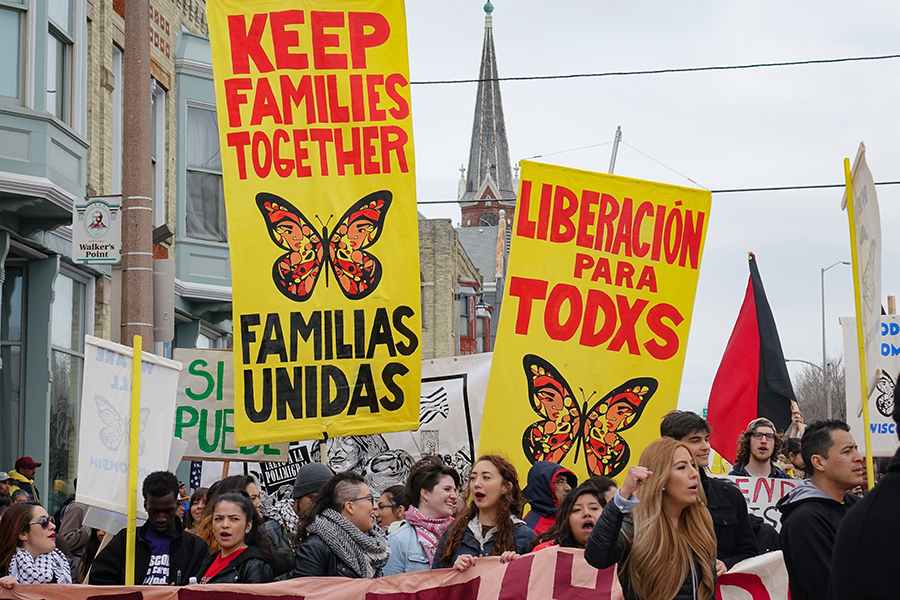A Core Narrative for Immigration Messaging
America needs a better way of talking about immigration. The dominant narratives we see circulated over and over do not reflect the values many of us share and are eroding public support for the kinds of policies our communities need. All the while, immigration enforcement, detention, and deportation cost taxpayers billions and lines the pockets of corporate interests. To distract and divide us from true solidarity, negative discourse has opened the door for dangerous and divisive proposals that serve no one beyond a narrow set of anti-immigrant activists. And while polls have shown that these groups don’t represent the public’s views, they do tell a consistent, values-based story that has caught on in public discourse, popular culture, and political dialogue. In other words, they exploit fear rather than actually working towards a future where we all prosper.
We need a new story around immigration, infused with solution stories and values that are meant to connect and liberate us all. We need to reclaim this conversation and infuse it with our solutions, our stories, and most importantly, our values.
General Messaging Guidelines
This flexible, values-based framework provides a foundation for more productive conversations about immigration. It is based on public opinion research, insight from media monitoring and analysis, and the experience of a broad range of immigration advocates, activists, and immigrant themselves. By starting from the following principles, we can move past fear and build towards consistent messaging that resonates and builds power for our communities.
Emphasize Workable Solutions: Americans across the political spectrum are beginning to see the true horrors of our broken immigration system and deportation and enforcement industry. Not only are current policies inhumane and unreasonable, but they also don’t actually build towards permanent solutions for immigrant communities. Our communications should promote solutions that enable full economic and civic participation, while helping our communities thrive. Given the difficulty of the national climate, focusing on impactful solutions at the local and regional narrative level is important.
Infuse Messages with Values: Americans are most likely to support policies that welcome immigrants when we connect them to our shared values of opportunity, community, equality, and shared responsibility. “Transactional” arguments about the costs and benefits of immigrants just reinforce the anti-immigrant frame of newcomers as a potential burden.
Stand Together: Anti-immigrant groups are actively working to drive a wedge between immigrants, Black Americans and other communities of color, and low-wage workers. We must rally around the values that we share and our common interests to expand opportunity for everyone—e.g., combining an earned pathway to citizenship with enhanced civil rights enforcement, living wages, and job training for communities experiencing job insecurity. When we unite and embrace immigrants push against the false narratives that blame immigrants for economic inequality and structural problems. Together, our vision of a shared, prosperous future becomes not just possible, but inevitable.
Remind Audiences that Immigrants are a Part of Us: Instead of describing immigrants as outsiders who benefit us, remind audiences that immigrants are and always have been integral to our communities and our nation. (Note that this is different from saying “we’re a nation of immigrants,” which is off-putting for many Black American and Native American audiences).
Understanding the Dominant Narrative
Anti-immigrant spokespeople are consistent in using two dominant themes, regardless of their specific point:
Criminality and Law and Order Narrative
- There is an inherent criminality to immigrating to the U.S.
- “What part of ‘illegal’ don’t you understand?”
- Threat of Terrorism, drugs, and danger
- Stealing “our” resources and avoiding contributing
- Job Competition
- Health Care Cost and Access
- Draining Social Services
Building a Message
While our core narrative should remain the same and its themes should weave throughout all of our communications, we can build effective messages for different issues and audiences using The Opportunity Agenda’s signature VPSA (Value, Problem, Solution, and Action) framework:
Value
History shows that we move forward as a country when we welcome new immigrants and work together to improve our communities.
Problem
Our broken immigration system makes legal immigration nearly impossible for many. This allows unscrupulous employers to exploit workers, undermining rights and wages for everyone while reducing tax revenue. Our current system harms both immigrants and American citizens. For immigrant communities, we’ve created a climate of fear and deep unsafety through our enforcement. For all Americans, it diverts money from needed government services while increasing the wealth of private detention center owners.
Solution
We need sensible immigration policies that recognize reality – immigrants are already contributing members of our communities. They are a crucial part of our economic engine and the social fabric of our society. They are part of the future of our country. The obvious solution – and one that most Americans support – is to fix our immigration system so that everyone who lives here can contribute and participate fully and without fear.
Action
Support policies that help our communities welcome immigrants and solve problems together. Call out those that profit from this immigration enforcement effort.
Key Talking Points
The talking points below show how to bring our shared story to life. We know that immigration advocates speak to different communities with unique regional concerns and challenges. What connects us are our common values. Try weaving these themes into your own words and style. This approach helps create a consistent message that resonates with the public while giving you the flexibility to communicate authentically in ways that work for your audience.
Workable Solutions
We must emphasize that we are proposing reasonable and practical solutions that address our community and our nation’s needs. By focusing on what actually works, we can reveal how anti-immigrant activists push harmful policies that divide us and distract from the real challenges we all face together. We can also build power across issues by showing that many of the villains in our fights for justice are the same or aligned.
- Building border walls or treating immigrants so badly that they’ll somehow “go home” have been tried and failed.
- Anti-immigrant extremists are preventing a legal immigration system that works and distracting us from addressing our real challenges to education, health care, and employment.
Mutual Aid
- Given the attack on people who immigrate or settle in the United States, we will need to see the activation of a robust system of aid and resources to protect these community members.
- Engaging in mutual aid support for immigrant justice helps us build new models of social support and justice. Given the difficulties in the immigration climate currently, this model allows us to flip the script on who can support and uplift these communities.
Local Anti-Immigrant Policies
- Policies that isolate and divide people fail everyone. We need workable, inclusive policies that serve all residents across our state, even as we continue pushing the federal government to fix our broken immigration system.
- Our cities and states are havens for our immigrant communities and are best suited to help them both survive and even thrive in this difficult time.
Due Process
- In America, the punishment should fit the crime. Not allowing judges to consider the circumstances of a case violates this principle and fails to resolve the problem of undocumented immigration. Judges need the freedom to look at the circumstances of each individual case and make decisions based on what’s best for that situation. These systems only have integrity when they are applied equitably and fairly.
Immigration Reform
- We need a realistic pathway to citizenship for undocumented immigrants. Immigrants want to come to America legally, but our current system makes that almost impossible. This system is impossible for a reason – intentionally leaving millions of people in limbo as our government hoards resources and divides communities across the country.
- Creating a clear path to citizenship and protecting the rights of all immigrants helps everyone in America, especially working families. When people are forced to live in the shadows without basic rights or opportunities, it drives down wages and jobs for all workers. This goes against what America stands for. By bringing everyone into our shared economy, we can rise together.
Uphold Our Values
Research shows that people react positively to messages that connect with their deeply-held values – especially those they see as fundamental to America. We can tap into this by underscoring that all immigration policies must reflect:
Community
Equality
Shared Responsibility
Opportunity
Justice
Human Rights
- Immigrants are part of the fabric of our society—they are our neighbors, coworkers, friends. Reactionary policies that force them into the shadows haven’t worked and contradict our values. Those policies hurt all of us by encouraging exploitation by unscrupulous employers and landlords. We support policies that help immigrants contribute and participate fully in our society.
- From its founding to today, America represents a promise of opportunity. We need an immigration system that welcomes those who come here ready to work hard, contribute their fair share, and become part of our shared American story.
- Every person deserves dignity and fundamental rights, regardless of where they were born. Standing against exploitation and upholding human rights reflects our deepest values as Americans.
Due Process
- Due process, fair hearings, and access to legal representation are cornerstone American values. These principles have guided our justice system since our founding and must remain at the heart of our immigration policies. These systems only have integrity when they are applied equitably and fairly.
Raids
- Militarized raids on families and workplaces, brutal detention facilities, and the lack of due process are un-American and a national shame. The United States was founded to reject violence and repression, not repeat it. This enforcement is coming at the expense of American taxpayers – all to help line the pockets of private prison companies and government contractors.
Family Reunification
- Some propose that we ignore family ties in our immigration system. But keeping families together resonates deeply across political and cultural divides—it’s a value Americans recognize in ourselves and admire in others. Welcoming newcomers but separating and splitting their families is contrary to who we are as a nation.
Help Us Move Forward Together
Our shared value of community reminds us that America thrives when we recognize our interconnectedness. When discussing people who immigrate, emphasizing our common bonds creates ground for productive conversations, putting others in an open frame of mind to consider immigration policies. Additionally, having trusted messengers share the ways that their immigrant neighbors keep their communities thriving is key.
By highlighting how shared prosperity benefits everyone, we can move beyond divisive rhetoric toward solutions that honor both our diversity and our unity. Remember: focusing on our collective strength doesn’t minimize our differences—it acknowledges that our varied perspectives and experiences create a more resilient and innovative society when we work together.
- We are for solutions that benefit communities, strengthen our economy, and create a system that works for everyone.
- We need shared solutions to improve health care, education, jobs, and the economy for everyone who lives here. Immigrants have a stake in those systems—we are caregivers and health professionals, teachers and students—and we are a part of the solution.
- Generations of immigrants have come to America in search of opportunity and have contributed to our shared prosperity. Preserving that tradition is essential to our future in an increasingly connected world.
- Immigrants, including undocumented immigrants, are a part of our state’s economic engine, and, most importantly, a part of our communities.
- Immigrants play a vital role in our communities, our culture, and our economy. We go to church, we volunteer with the PTA, we pay taxes and work at hard jobs that our economy needs.
- Our economy and our trade and immigration policies aren’t working for anyone but a select few. Instead of scapegoating immigrants and terrorizing families and communities, we should make America work for all of us.
Mix and Match
To effectively advance a positive narrative about immigrants and immigration, we can determine which elements are the most effective to the point we need to make and then weave them in. It’s the cumulative effect of these messages that will ultimately create the narrative we need to start to put the immigration story back on track.
Crafting effective immigration messaging requires strategic selection from our narrative framework. By identifying which elements resonate most powerfully with specific audiences and contexts, we can tailor communications that advance our broader goals. Each message becomes a building block—contributing to a cohesive story that, through repetition, helps reshape public understanding. This layered approach creates momentum over time. As consistent themes echo across different channels and messengers, they reinforce one another, gradually shifting the immigration conversation toward more productive and humane ground. Remember that narrative change is cumulative—each communication adds another thread to the new tapestry we’re weaving about America’s immigration story.
- We need to move from our broken immigration system to one that is orderly, workable, and productive. We can do that by allowing people who are part of our communities and families earn a pathway to citizenship. Along with reforms like increased civil rights enforcement and sanctions for employers that exploit workers will raise wages and expand economic opportunity for everyone.
- A pathway to citizenship and human rights for current and future immigrants is crucial to the interests of our country and, especially, to the interests of working Americans. If our government keeps people in the shadows, without rights or a shot at the American Dream, it will depress the wages and job prospects of all workers in this country. And it will continue to violate the values we hold dear. But if we move those people into the economic mainstream, we can rise together.





